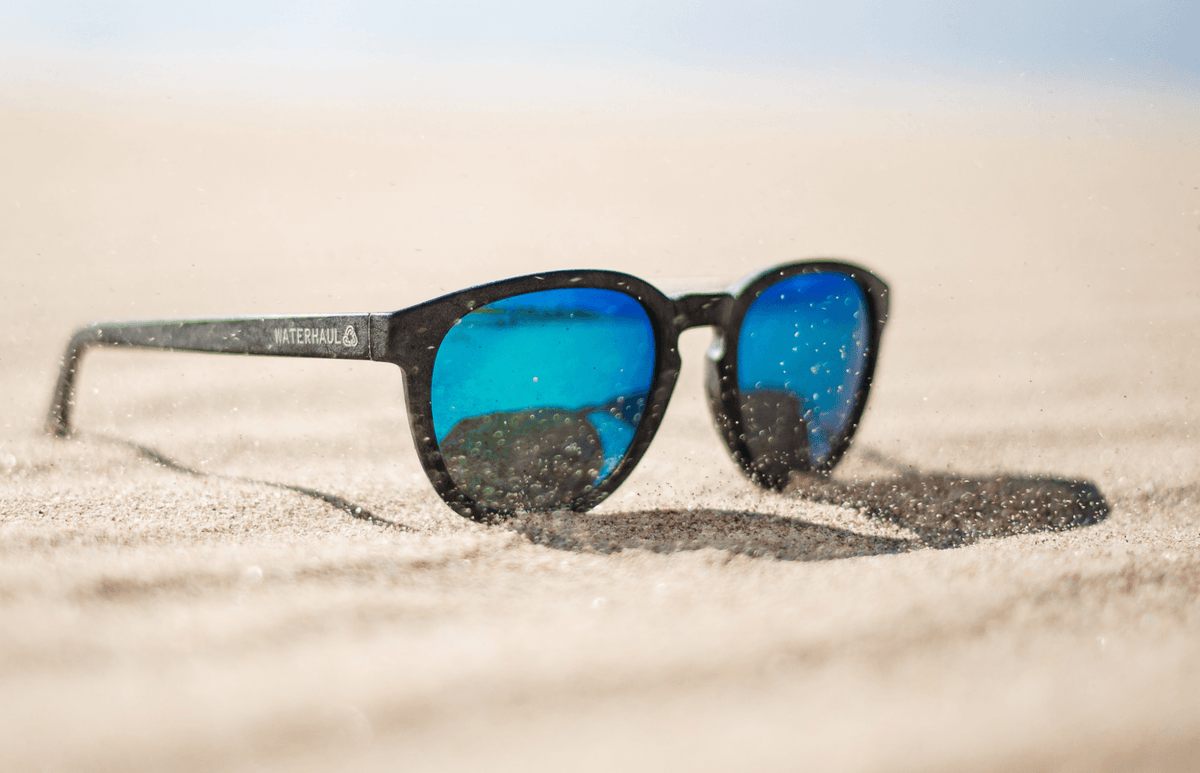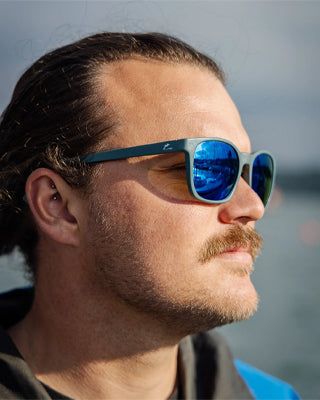SUNGLASSES LENS MATERIAL GUIDE:
WHY WE USE MINERAL GLASS LENSES
When designing our sustainable eyewear, we knew that alongside the sunglasses frames being made from recycled fishing nets, one of the most important factors to consider was the quality of the lens, but why did we opt for Barberini mineral glass lenses for our recycled sunglasses?

We use Mineral Glass+ lenses in our sustainable sunglasses.
We reviewed lenses from a huge range of manufacturers but found that Italian eyewear producer Barberini, famous for producing the world’s most technical glass lenses, couldn’t be beaten for their super lightweight mineral glass lenses (just 1.8mm thick!), their optical experience, and their triple-layer anti-reflection coating.
We pay over four times more per lens than comparable high-end plastic lenses, making our mineral glass lenses the most expensive component of our recycled sunglasses! We’re not aware of any other brands that use Barberini lenses with a price tag below £250, let alone below £100 like our eyewear ranges, but what makes these sunglasses lenses in particular so special?
Here’s a breakdown on the three key reasons why we believe in choosing high quality mineral glass sunglasses lenses over plastic ones, and why they make our eco sunglasses ideal for those who enjoy spending their time doing sports, or other outdoor pursuits!
OPTICAL QUALITY

Mineral glass provides far greater optical clarity than plastic.
Mineral glass has by far the greatest optical clarity of all lens materials. There’s a reason why photographers use glass lenses: plastic mediums disperse and distort light.
The optical clarity of a glasses lens is measured with an Abbe value, the measure of a lenses dispersion of light, with lower numbers representing greater dispersion and unwanted chromatic aberration. Chromatic Aberration is an image distortion due to a lens being unable to focus all the different colour wavelengths of light onto the same focal point, often resulting in a purple or green fringe around the edge of the subject you’re looking at. The Abbe Value of our lenses is 59, vastly exceeding the polycarbonate (plastic lens) value of 32.
This clarity not only gives Waterhaul eyewear crisp detail, but it also gives the wearer the feeling of true vision, and not the feeling of ‘I’m looking through a layer of plastic’, which improves eye comfort and reduces eye strain, particularly when they’re worn for long durations. Waterhaul has produced over 25,000 pairs of frames showing how popular the high quality lens and crystal clear clarity are. One of our most popular style of sunglasses with mineral glass lenses is the Fitzroy Slate sunglasses, or try our Harlyn Navy sunglasses for a round frame style.
SCRATCH RESISTANCE

Our mineral glass lenses have been chemically hardened to be extra scratch-resistant.
Waterhaul sunglasses are designed for the beach, which is the one of the most testing and difficult environments for any item to function on. Beaches means lots of exposure to salt water and sand – the mortal enemy of most sunglasses! Plastic lenses in these environments do not fair well, as they are easily scratched causing any UV film to be also damaged reducing their protection and meaning you'll be paying for another pair sooner rather than later.
Our chemically hardened, polarised lenses are more scratch resistant than any form of plastic lens, even those with ‘anti-scratch’ coatings’ by a huge margin. Given that glass and sand are both comprised of silica, this isn’t hugely surprising!
To clarify, we're not saying that our sunglasses are immune to scratches, but four years later we still have some of our first prototypes in daily use, and with our beachgoing lifestyles, this definitely wouldn’t be possible with plastic lenses! Our lenses also exceed all international impact resistance tests. We also are prepared to back up our words. All Waterhaul sunglasses including our recycled plastic prescription sunglasses and our eco friendly Kynance sustainable glasses come with a lifetime warranty. In the event your shades somehow get damaged, we will recycle and replace them for free. Our eyewear and shades are designed in house by our team who love the outdoors and testing themselves against the elements, we built our eyewear to be the best and perfect for adventures.
SUSTAINABILITY

Glass is a much more sustainable lens material than plastic.
While you would be right to assume that alongside our sunglasses frames made from recycled fishing nets would be well paired with lenses made from recycled plastic, the technology for truly recycled plastic lenses has not yet been developed! But this is a field we’re watching closely.
Glass however, is infinitely recyclable, which when combined with its scratch-resistant properties, gives it a much longer lifespan than a plastic lens. Most plastic lenses only survive 2-3 years, for those who love wearing them whilst outside and enjoying themselves in a sporting activity or outdoor adventure this can be even less. We do not believe this should be the case. Which is why our sunglasses and lenses are built for adventure, we want you to use them frequently and enjoy pulling them on every single time. All lenses are initially produced as rectangles or circular disks, which are then cut to fit the frames. This process naturally results in waste as the lenses are trimmed down, which isn’t a concern again for Waterhaul and our sustainable and eco conscious community. Glass lenses, unlike plastic ones are not produced this way and do not have this waste, or produce harmful microplastics which then are exposed to the environment.
We’re incredibly proud of our lenses and believe that Waterhaul customers come for the impact of our durable and symbolic recycled plastic sunglasses frames, but stay customers for life due to our high quality lenses and commitment to combat plastic pollution.
10% OFF YOUR FIRST ORDER
Join our NETwork for events, all things ocean conservation and exclusive private sale launches
